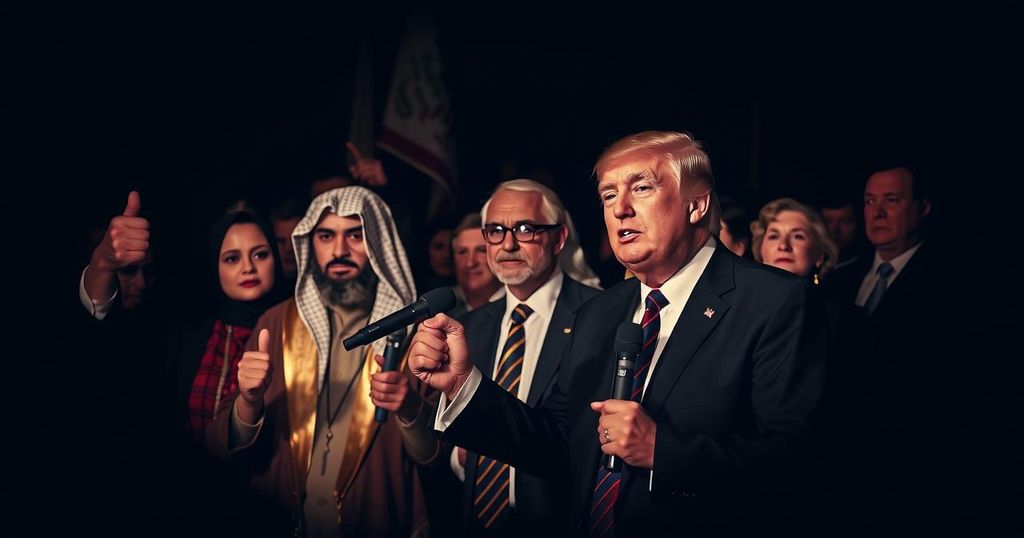Arab Americans in Dearborn Urge Trump for Ceasefire in Gaza and Lebanon

Arab Americans in Dearborn are urging President Trump to advocate for a ceasefire in Gaza and Lebanon, expressing concerns related to ongoing conflicts affecting their community. Despite initial support during the campaign, there are anxieties about Trump’s cabinet choices dismissing Arab perspectives. Their letter emphasizes the necessity of a just ceasefire as a foundation for lasting peace in the region.
In the aftermath of Donald Trump’s election victory, Arab Americans from Dearborn, Michigan, who previously hosted him, have formally requested that he advocate for a ceasefire in Gaza and Lebanon. This appeal is rooted in their concern for the impact of ongoing conflicts in the region, particularly on Lebanese Americans who have family ties affected by the violence. In a letter dated November 8, 2020, community leaders expressed their expectation for Trump to leverage his political influence to facilitate peace, highlighting his earlier promises to pursue stability in the Middle East and the importance of an unconditioned ceasefire as a precursor to effective negotiations. The letter, signed by prominent figures in the Dearborn community, underscores their growing apprehension regarding Trump’s cabinet selections, which they fear may not be sympathetic to Arab American interests and perspectives. The collaboration between Trump’s campaign and the Arab American community was particularly significant in the Dearborn area, noted for having the highest concentration of Arab Americans outside the Middle East. Trump’s campaign efforts garnered substantial support from this demographic, leading to his victory in the city and statewide. However, with recent cabinet appointments, such as Mike Huckabee for ambassador to Israel, community advocates are expressing disapproval, fearing dismissive attitudes towards issues pertinent to Palestinians and Lebanese citizens. They are also urging Trump to appoint individuals with a balanced view regarding Middle Eastern affairs, such as Richard Grenell, whom they believe could foster a constructive diplomatic approach. Despite the initial warm reception by Arab Americans, the lack of a public statement from Trump regarding a ceasefire, particularly in the face of violence in Gaza and Lebanon, has left many in the community feeling apprehensive. The leaders’ letter concluded by reaffirming that a just ceasefire is essential for peace negotiations, a sentiment that resonates deeply within the affected population. Additionally, they emphasized their commitment to engagement with the Biden administration, advocating for accountability regarding U.S. arms sales to Israel and urging for an active role in mediating peace in the region. The political landscape remains uncertain as these communities seek assurance from their leadership during a tumultuous time.
The Arab American community in Dearborn, Michigan, has been actively engaged in political discourse surrounding U.S. foreign policy in the Middle East, especially regarding the ongoing conflicts in Lebanon and Gaza. Dearborn is recognized for its significant Arab American population, primarily consisting of Lebanese Americans who maintain strong familial ties to the region. Trump’s recent visit and subsequent electoral support from this community mark a notable political alliance, with community leaders leveraging their influence to request action on pressing humanitarian issues. This context is vital for understanding the push for a ceasefire and how the community navigates relationships with political figures.
The Arab American leaders from Dearborn are hoping for a proactive response from President Trump regarding their request for a ceasefire in the Middle East, reflecting their concerns about the ongoing conflicts affecting their community. As they advocate for accountability and support from leadership, their calls for diplomacy highlight the urgency for a balanced approach to U.S. foreign policy in the region. The evolving dynamics with the Biden administration further illustrate the complexities of navigating U.S. relations with Middle Eastern countries amidst ongoing advocacy from the Arab American community.
Original Source: www.freep.com








